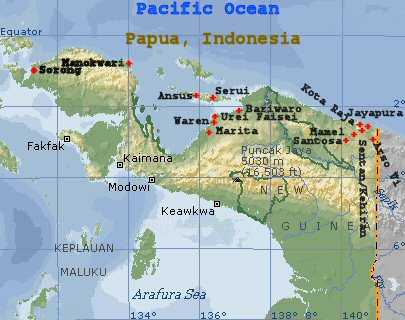Share your coffee stories with us by writing to info@comunicaffe.com.
DOGIYAI, Papua, Indonesia – After successfully promoting Indonesian coffee at the global level through the Specialty Coffee Association of America (SCAA) Expo 2016, the Indonesian Minister of Trade, Thomas Trikasih Lembong, is engaging coffee observers and the world community to get closer to Papuan Coffee through the “Proudly Brewing Papuan Coffee” Program.
The Launch of the “Proudly Brewing Papuan Coffee” Program was done in the Regency of Dogiyai, Papua, today (11/6). The launch was also an important part of the “Papua Working and Excelling Movement”, which is a program that belongs to the Papua Working Group that is fully supported by the Ministry of Trade.
“The Papua Province has the potential for world class coffee. Papua is one of the most favored coffee producing regions in Indonesia besides Gayo, Mandailing, Java, Toraja, Sumatra, and Sulawesi Coffee,” said Tom Lembong.
The data of Papua Province’s Plantation office recorded 18 coffee producing villages and districts in Papua spread throughout the Regency of Jayawijaya, Tolikara, Lanny Jaya, Bintang Mountains, and Dogiyai.
The Trade Minister explained that a number of coffee observers from Jakarta is also taking part in this campaign.
Together with the Central Government, there are invited to educate people about the technique of cultivation, post harvest processing, and marketing.
“This empowering and educational event is beneficial for improving the welfare of farmers to be more optimum. We know that consumers are willing to pay an expensive price for delicious coffee, but unfortunately most farmers don’t really know the selling price of coffee in the market,” Trade Minister Tom added.
The Regency of Dogiyai has 10 sub-districts that as a whole has the potential for coffee but have yet been able to maximize their production.
In this regency, the Trade Minister saw up close the phases of coffee production and the drying facilities and the entire production process from the beginning to the end. The current coffee processing process in Dogiyai is still traditional.
Even the machines such as millers that they use are of Dutch heritage and have yet to be revitalized. The process of drying and hulling is still done manually, and the coffee is roasted using a stove and then milled.
The coffee farms in the Regency of Dogiyai are heritage farms of Dutch missionaries of the 1890s. During that era, a large part of the people of Dogiyai were coffee farmers. Concomitant with the changing of the times, less people were farming coffee and changed profession into becoming construction workers to earn money faster.
Prior to this, the Trade Minister went to visit a coffee plantation in the Regency Tolikara and had a dialog with local coffee entrepreneurs.
The Trade Minister hoped that these indigenous Papuan coffees could become the pride of the People of Papua and become a commodity that could improve the welfare of Papuans.
Improving the Welfare of Coffee Farmers
Meanwhile, the Ministry of Trade’s Head of the Strategic Issue Management Center, Ni Made Ayu Marthini, who participated in the event talked about the importance of education along with facilities and infrastructure support for coffee farmers.
“Coffee farmers in Indonesia also needs to understand the price of coffee in the market so that it can have a high sales value leading to an improvement of farmers welfare,” said Made.
There are many local coffee farmers that do not know the price of coffee in the market. The price of coffee cherries is rarely talked about even though many farmers are being paid with coffee cherries for their coffee products.
Besides that, farmers should also understand that the ratio of coffee resulted from the processing of cherries into green beans are 7 to 1.
Meaning that for every 7 kg of coffee cherries processed a yield of 1 kg of coffee green beans is produced. The current price of coffee cherries and coffee beans sold by coffee farmers is still considered low.
Made chose as an example the Regency of Dogiyai where the farmers do not sell coffee in the form of cherries.
The coffee being sold at Dogiyai are in the form of roasted beans or powder sold within the price range of IDR 30,000 – 35,000/kg.
Meanwhile, farmers in West Java are selling coffee cherries they’ve harvested at only IDR 7,000 – 8,000/kg or in other parts of Java coffee cherries harvested are being sold at the price of IDR 6,000 – 8,000/kg.
“It’s only right that coffee farmers get a higher price in order to give good economic value to farmers,” explained Made.
Coffee Curriculum
The Regency of Dogiyai also has 5 coffee SMEs one of which is mentored by a Pastor.
Aside from the heritage coffee farms of the Netherlands, the Regency of Dogiyai also has a 1 hectare coffee farm belonging to the Yayasan Pendidikan Persekolahan Katolik (YPPK) / Educational Foundation of Catholic Schools’ Junior High School.
This school has added coffee education to its teaching curriculum where students are taught in school to pick and process coffee.
Made hopes that Papuan Coffee can penetrate the export market in the next three years and can be served at the National Games/Pekan Olahraga Nasional (PON) in Papua year 2020.















